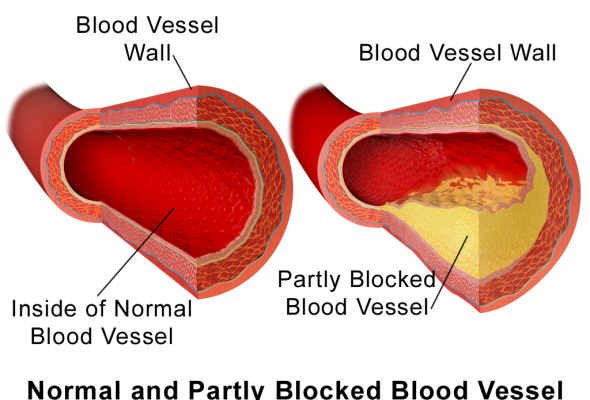
Main Function of Our Hearts
Our hearts are made up of specialized muscle that contract regularly and continually to allow oxygenated blood (oxygen-rich blood) and nutrients to be delivered to all our body cells through a complex network of arteries. By contrast, deoxygenated blood (oxygen-poor blood) and waste products produced by body cells will be transported back to our hearts through veins to excretory organs for disposal.
Primary Factors for Heart/ Cardiovascular Diseases
High level of LDL-cholesterol (low density lipoprotein) and inflammation are the major contributors to the cardiovascular disease. Over consumption of fried foods and baked goods made with shortening or partially hydrogenated vegetable oils will lead to increased level of LDL and decreased level of HDL (high-density lipoprotein). LDL-cholesterol are small and they are easily slip through the cells and build up in arterial walls. Small LDL particles are more readily oxidized and developed into cytotoxic oxidized LDL. Oxidized LDL is then taken up by arterial macrophages to form cholesterol-rich plaques. Over time, the plaques build-up will cause narrowing and hardening of the arteries, and restricting blood flow to the heart. Since there is insufficient oxygenated blood to reach the heart, ischemic heart disease occurs.

Heart-Healthy Properties
Numerous studies have shown the following unique benefits of palm tocotrienol complex that are NOT shared by alpha-tocopherol (the common form of vitamin E) such as below:
- Cholesterol Lowering Property;
- Regression of Atherosclerosis;
- Maintains Arterial Compliance;
- Maintains Healthy Lipid Profile
(1) Cholesterol Lowering Property
Tan and colleagues conducted the first clinical study on the effects of palm oil vitamin E concentrate (42mg tocotrienols, 18 mg tocopherols, and 240mg palm olein) tocotrienols on 22 healthy volunteers for 30 days. Results showed that the total cholesterol and LDL-cholesterol decreased from 5% to 35.9% and 0.9 %- 37% respectively [1].
In addition, Qureshi et.al compared the effects of supplementation of 200mg palm vitee/ day with 300mg of corn oil for 8 weeks on the serum lipid concentration of 25 hypercholesterolemic subjects. 15 subjects demonstrated reduced serum total cholesterol and LDL cholesterol by 15% and 8% respectively during the first 4 weeks. 7 subjects showed decreased serum cholesterol by 31% during the 4-week period of treatment that included tocotrienols; and interestingly, the cholesterol-lowering effect was carried over for 2 weeks even when the supplementation has discontinued [2].
A randomized, open-label study of patients with mild hypercholesterolemia (= 5.18mmol/L to <7.77mmol/L) and one additional cardiovascular risk factor was carried out. Subjects received either 50mg of bio-enhanced palm tocotrienol complex or vitamin E (α-tocopherol) 500mg daily. Fasting lipids were compared at baseline and after 4 weeks therapy. Following 4 weeks therapy, mean total cholesterol declined significantly in the tocotrienol group compared to the α-tocopherol group. Mean LDL-C levels were also significantly reduced in the tocotrienol group, but not in those on a-tocopherol. There were no significant changes in HDL-C and triglycerides (TG) in both groups. The tocotrienol group experienced a net decline in TG while the α-tocopherol group had a net increase at week 4. The study adds to existing evidence of the favorable effect of tocotrienols on total cholesterol and LDL-C [3].
(2) Regression of Atherosclerosis
Double blind placebo controlled human study conducted at the Kenneth Jordan Heart Foundation showed that supplementation of palm tocotrienol complex at 240mg/day for 6 months led to regression of atherosclerotic plaque in 92% of the participating patients with carotid stenosis (narrowing of the main artery supplying blood to the brain). None of the patients receiving placebo showed atherosclerotic regression, in fact, 40% of them showed progressive disease [4].
(3) Maintains Arterial Compliance
Reduced arterial compliance is an independent risk factor of heart diseases. Arterial compliance can be assessed by measuring the carotid femoral pulse wave velocity (PWV) and augmentation index (AI). A low velocity of PWV and small AI value indicates better arterial compliance and vice versa. In this placebo controlled clinical trial, 36 healthy males were randomized to receive daily supplementation of 50mg, 100mg, 200mg of bio-enhanced palm tocotrienol complex and placebo for 2 months. The results showed that all tocotrienol-treated groups showed significant increase of plasma α-, δ- and δ-tocotrienol compared to placebo. In addition, tocotrienol-treated subjects also had significant reduction in augmentation index (up to 8.7% reduction from baseline) while both 100 mg and 200 mg tocotrienol groups demonstrated significant reductions in pulse wave velocity (up to 10% reduction from baseline). This indicates that tocotrienol could potentially reduce the risks of developing cardiovascular diseases by improving arterial compliance or reduced arterial stiffness [5].
(4) Maintains Healthy Lipid Profile
Professor Yuen and his team studied the effects of tocotrienols on cholesterol levels. In this study, the subjects consumed either 300 mg bio-enhanced palm tocotrienol complex or placebo (300 mg soybean oil) capsules daily for 6 months. The results showed that individuals on tocotienol group had significant reduction on total cholesterol and LDL (low-density lipoprotein) cholesterol on the 4th month of the study. The levels of total cholesterol and LDL cholesterol continued to demonstrate reduction on 5th and 6th month of supplementation in tocotrienol supplemented group compared to placebo [6].
References:
- Tan TS et.al. (1991). Effect of a palm-oil-vitamin E concentrate on the serum and lipoprotein lipids in humans. Am J Clin Nutr; 1027S-1030S.
- Qureshi et.al (1991). Lowering of serum cholesterol in hypercholesterolemic humans by tocotrienols (palm vitee). Am J Clin Nutr; 53:1021S-6S.
- Ajuluchukwu JN, et al. (2007). Comparative study of the effect of tocotrienols and alpha-tocopherol on fasting serum lipid profiles in patients with mild hypercholesterolaemia: a preliminary report. Niger Postgrad Med J. , 14 (1), 30-3.
- Kooyenga, DK et.al. (1997). Palm oil antioxidant effects in patients with hyperlipidaemia and carotid stenosis-2 year experience. Asia Pacific J Clin Nutr 6(1):72-75.
- Rasool AHG, et al. (2008). Arterial compliance and vitamin E blood levels with a self-emulsifying preparation of tocotrienol rich vitamin E. Arch Pharm Res Vol, 31(9), 1212-1217.
- Yuen KH, et al. (2011). Effect of Mixed-Tocotrienols in Hypercholesterolemic Subjects. Functional Foods in Health and Disease, 3, 106-117.